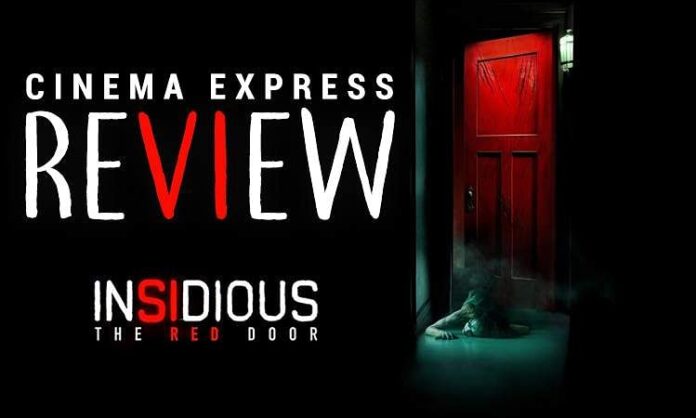
Insidious: The Red Door is an interesting film. Not for anything typically expected of a horror film but for an entirely different reason. Insidious: The Red Door stops short of touching the ‘so bad it’s good’ territory while also squandering away a perfectly competent premise. This just means that while the good moments in the film are not nearly good enough, the low moments still aren’t low enough to extract entertainment out of them. The net result is a bungled mess that leaves you numb with the new levels of boredom it unlocks with each passing story beat. You don’t even feel like dredging up enough energy to shut off your brain and just enjoy the cheap thrills, for the simple fact that there aren’t enough.
Director: Patrick Wilson
Cast: Patrick Wilson, Ty Simpkins, Lin Shaye, Rose Byrne, Sinclair Daniels
Years after the terrifying incidents shown in the first two films, the Lambert’s have divorced and as Josh Lambert (Patrick Wilson) struggles to connect with his son Dalton (Ty Simpkins), a series of incidents trigger memories from the past, which inadvertently brings back the paranormal entities to haunt the Lambert’s again. The film starts off with a promising emotional core predicated on the strained relationship between the father and son. Josh Lambert’s frustration as he repeatedly fails to connect with his son is strongly registered in the scene where he drops him off to start his college life. Even though the third act of the film is largely reliant on whether the father and son reconcile their differences, apart from the above-mentioned scenes, we barely see the characters interact or talk to each other. They do talk over the phone but the emotional heft of these scenes doesn’t register hard enough, which leaves us not caring enough about these characters.
The film has the franchise star Patrick Wilson stepping up to helm the project in his debut directorial effort. Patrick Wilson has delivered enough consistent performances to elicit confidence whenever he steps inside the frame. While he handles the themes and the emotional foundations of the story with enough acuity, there seems to be a marked indifference with which he draws out the performances. Characters portray emotions with intensity at times and at other times the actors seem to be imitating a vague idea of how a character like that is supposed to react in a film like this. Rose Byrne in particular seems to drift in and out of the frame with expressions that screams cold indifference to the entire existence of the film.
The film does offer some decent jump scares but they pale in comparison to what the franchise offered when it started. The technical elements like the sound design, camera work, lighting, makeup and special effects work their hardest to make the paranormal entities barely frightening. However, the idea of what these entities are trying to achieve fails to thrill us with a banal motive like, “They’re trying to get to our world to kill people and whatnot”. Even ghosts have to abide by storytelling rules to keep us engaged. Hollywood needs to stop conflating nauseating visuals with horror. Ghosts or a demonic entity projectile vomiting on the face of its victim, while being a staple part of horror films since the 70s, seems to have overstayed its welcome, if it was ever welcomed at all. Can Hollywood just focus on making its horror audience feel fear instead of making them repulsed for no reason?
There are some half-hearted efforts to explore themes like mental illness and intergenerational trauma but they don’t work because we don’t care about the characters. A large part of our indifference to these characters could be attributed to the lack of heartfelt moments between these characters. The central characters barely interact in person with each other and the characters that do interact often ( Like Ty Simpkins and Sinclair Daniels’ characters) seem to have one-dimensional relationships that seem to evolve rapidly at the behest of the story’s need to wrap things up.
Perhaps one of the most fundamental problems with Insidious: The Red Door is how it feels like a vague, low-resolution imitation of a number of generic blockbuster horror films. However, it betrays a sense of insincerity with the way it handles human emotions and character evolution. It feels like a feature-length version of a deep fake video that conjures up an imitation of a celebrity well but also looks deformed and unnatural.
Rating:
#lowres #imitation #generic #horror #films #Cinema #express

